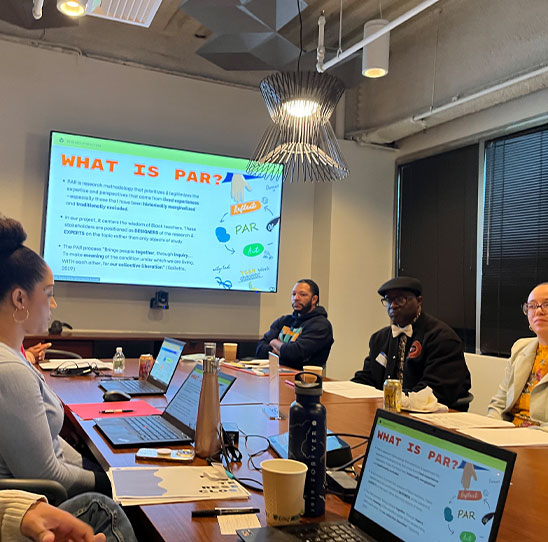Social science research generates practical knowledge to help us better understand our world and solve problems. However, traditional approaches to research have their limitations. Knowledge is power, and researchers shape what knowledge emerges from their work through the choices they make during the research process–from the questions asked to the approaches used to answer them. The ability to craft knowledge positions researchers as power players in policy conversations.
Outsized researcher influence can be problematic. It can relegate communities to the status of passive research subjects, distort their experiences, and narrow the resulting discourse about them. Relatedly, traditional research only indirectly addresses the injustices marginalized groups face; there is often no explicit connection between the research itself and solutions to the problems it highlights. This can lead to misguided recommendations and, ultimately, outcomes that do not serve these groups’ best interests.
Research for Action (RFA) is challenging this paradigm by offering opportunities for the communities most affected by research on a particular topic to conduct it themselves. In 2023, RFA launched Voices for Change: A Black Educator Action Project. The project employs Participatory Action Research (PAR) methodology. PAR is a liberatory approach that subverts traditional power dynamics by positioning groups typically excluded from knowledge production, in this case Black teachers, as researchers. With training and guidance from the RFA team, the Black teacher-researchers construct research questions, select methods, collect data, and interpret their findings. Framed by their own lived experiences with the inequities of the education system, the Black teacher-researchers produce more relevant and accurate findings than traditional researchers who lack these crucial insights. Furthermore, and critically, the PAR approach mandates that its practitioners not only make sense of their collective experiences with oppression but also take action, consistent with their research, to challenge the root causes of them.
To date, RFA has convened two cohorts of Black teacher-researchers from across the country to investigate and process the shared, yet varied, ways race has affected Black teachers professionally. The Pilot Cohort, which ran from Summer 2023 to Spring 2024, brought together teachers from Detroit and Philadelphia–two predominantly Black cities with similar histories of underfunded and over-criticized schools. Begun in Summer 2024, Cohort 1 has built off the template established in the Pilot but with an expanded, national scope, as the teacher-researchers represent sites from coast-to-coast. Each cohort has taken a slightly different angle to their work, but the studies have had some throughlines—focusing on the unique contributions and challenges of Black educators, their reasons for leaving the classroom, and what keeps them in the profession.
Similarly, the findings of each study have shared some broad themes. Black teachers interviewed in both studies highlighted the racism endemic in the education system. They recounted traumatic stories of navigating assumptions about the inferiority of Black teachers and students, barriers to professional advancement, and racial microaggressions. These challenges, unique to Black educators, compound the stressors inherent to the teaching field. Participants emphasized the importance of forging strong relationships with Black colleagues who could empathize with their experiences and provide mentorship as a factor that sustained them amidst the struggles. Based on the data, both cohorts recognized the importance of creating safe spaces for Black teachers to receive affirmation and advice.
While traditional research would have disseminated these findings through a product like a report, PAR encourages researchers to think beyond conventional limitations, dream bigger, and take action to solve challenges. Both cohorts have answered the clarion call. The Pilot Cohort, for instance, designed a sustainable mentorship program that would position veteran Black teachers as advisors to new educators. Cohort 1 is currently thinking through how to design new affinity spaces and expand existing ones to meet the needs of Black teachers.
Traditional research runs the risk of pathologizing the communities it studies by concentrating on their struggles and shortcomings. The narrative can easily become that the community is nothing more than its flaws–that it is, indeed, inherently flawed. The PAR studies rejected such deficit framings, centering the irreplaceable contributions Black teachers make despite the challenges they endure. Both cohorts found that Black teachers embrace culturally relevant pedagogies, intentionally cultivate authentic relationships with Black (and all) students, and have an unflinching belief in their capability. These characteristics make Black teachers vital assets to their students and schools.
The cohorts realized that creating meaningful change would require the public to view Black teachers in this light–as indispensable assets facing a dire situation. As part of this vision, RFA will soon launch a microsite, Black Educator Voices, that will house authentic products (podcasts, blogs, etc.) recounting the triumphs, joys, and struggles of Black teachers in their own words. Cohort 1 will be adding several contributions to the microsite in the coming months. And teacher-researchers from the Pilot Cohort have released a three-episode limited podcast series, Black at the Whiteboard, that offers an in-depth look at the experiences of some of the Black teachers who participated in the PAR project. This podcast will live on the microsite and can also be found on your favorite streaming platform. You can watch the listening party that launched the series here.
